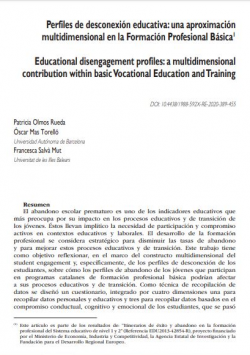
Educational disengagement profiles: a multidimensional contribution within basic Vocational Education and Training
Year: 2020Authors: Patricia Olmos, Óscar Mas & Francesca SalvàDOI: 10.4438/1988-592X-RE-2020-389-455Link: http://www.educacionyfp.gob.es/revista-de-educacion/numeros-revista-educacion/numeros-anteriores/2020/389/389-3.htmlKeywords:
Early school dropout is one of the most concerning educational indicators, exerting a large negative impact on young people’s educational and transitional outcomes. The needs of young people include active engagement and participation in both educational and work settings. Refinement and expansion of vocational education/training is considered an important strategy for decreasing dropout rates and, as well, improving young people’s educational and transitional processes. The current work aims to delineate how the dropout profiles of young people involved in Catalan basic vocational education and training programmes might negatively impact their educational and transitional prospects. The approach taken is within the multidimensional construct of student engagement theory and, specifically, from disengaged students’ profiles. A questionnaire, integrating four dimensions – one involving collecting personal and educational data and three that collected data based on the students’ behavioural, cognitive and emotional engagement – was designed as a data collection technique. It was given to a sample of 277 youths who were involved in some of the 24 basic VET programmes that ran in 14 centres of Barcelona and its surrounding regions. The descriptive and inferential analysis of the engagement dimensions, educational factors, and sociodemographic variables – which become more significant in relation to disengagement profiles within the framework of the basic VET programmes of these young people’s profile – show a group of youngsters who agree with the behaviourally disengaged profile (in males) and cognitively and emotionally disengaged profile (in youth from immigrant conditions and from lower socioeconomic status). Despite these risk factors, there also are positive ones. Indeed, these results bring us closer to the problems related to students’ dropout. Knowing that young people report disengagement on the three engagement dimensions can help predict young people’s risk of dropping out and identify which difficulties they could have to meet successful educational and transitional processes.
![[DEV] Orienta4YEL](https://www.orienta4yel.eu/public/img/logo-horizontal.svg)






